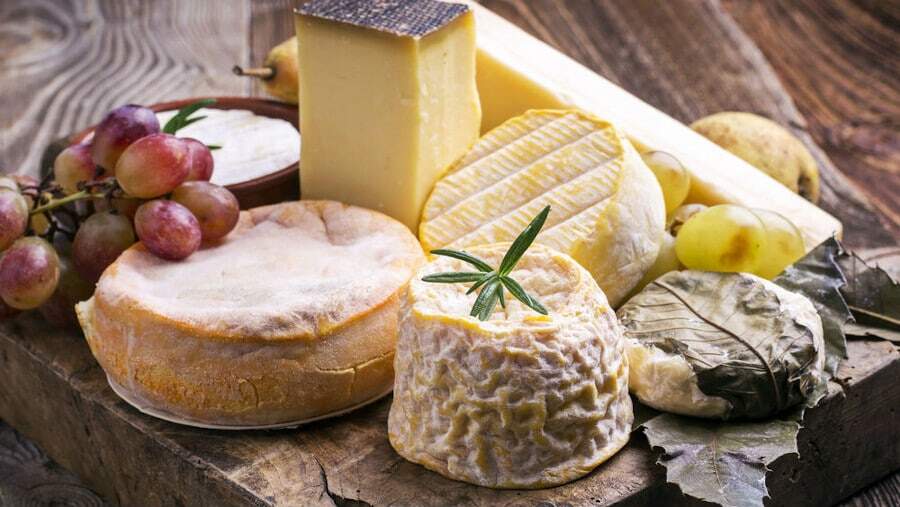The first ritual eating place in the Aegean was discovered in Despotiko, the uninhabited islet southwest of Antiparos. There, sailors feasted and made sacrifices to the god Apollo starting in the 8th century BCE. Among the items found were pots, plates, stone sinks and cookware such as kettles, amphorae, and drinking vessels.
This rich gastronomic history continued over subsequent years, resulting today in the fact that a large number of Cycladic products, meals and sweets, remain distinctive within the marketplace of Greece and elsewhere. Among them are black bread, from which paximadi are made, fava, klosta (thin stripes of handmade pasta, found in the Aegean Islands, mostly in Amorgos and Donoussa), cheeses (ladotiri, melipasto, chloro, xinomizithra, kopanisti etc.), sour apples, psimeni raki, rakomelo. Xerotigana, pasteli (with caraway seeds served on lemon leaves), loukoumi, soumada, tsipouro (from berries), pontzi (a strong reiki-honey-based raki drink), but also specialized pork-based dishes and appetizers (tsigarides, lardi, ziladia or pihti, sisira and others).
The Dodecanese, the other large cluster of Aegean islands located in the southeast, has seen the strong influence from a number of cultures with varying traditions, but with little impact on the gastronomy of those islands. These islands are regions with a significant acreage of fertile cultivatable land, and have thus made exhaustive use of the products of their soil, resulting in their vegetables and legumes playing a leading role in their traditional cuisines.
Purple amaranth and verdolaga yiahni, gemista, fried tomatoes, “barbounia” beans, pitaroudia with chickpeas and onion are some of the local recipes.
Red meat and chicken also play a leading role in the dishes, while handmade pastas, a specialty of Rhodes, also are high on the list. Not absent from the dining table are fish and vegetables, as well as a large variety of sweets, such as melekouni, moschopoungia, tahini pita, amygdalota, and kourabie.
The local delicacies complement their excellent wines.
The islands of the northeastern Aegean (Lesbos, Chios, Samos, Lemnos, Ikaria, along with smaller ones) also offer exceptional products. With olives and superior-quality olive oil as basic ingredients within their vibrant productive culture, they are able to produce numerous kinds of cheese, such as the renowned ladotiri, touloumotiri, kaseri, mizithra, feta, graviera, as well as excellent traditional yoghurt. Also widely acclaimed is Mytiline’s ouzo, while its wine was well-known from antiquity, along with its fish, seafood and its highly-appreciated sardines, as well as the so-called ‘fruits of the sea’: sea urchins, shellfish and the less well-known clamshell varieties. A special place in local gastronomy is held by mastiha, the unique product that grows exclusively in Chios, and the famous oranges and tangerines of Kambos.
The cuisine of these islands is distinguished by their multifaceted gastronomic character, reflecting all of the cultural influences they have experienced through time. It consists of a traditional agricultural cooking based on the simple, everyday local products of each region and urban area as developed by the islands’ rich and widely-traveled residents, along with the influences from the shores of Asia Minor and its refugees.
Protected Designation of Origin (PDO) and Protected Geographical Indication (PGI) products:
| Regions | Product | Designation of Origin and Geographical indication | Region unit |
| North Aegean | Olive oil | Lesbos (PGI) | Lesbos |
| North Aegean | Fruits, vegetables | Mandarins (PGI) | Chios |
| North Aegean | Olives | Throumba olives (PDO) | Chios |
| North Aegean | Natural gums, resins | Chewing gums (PDO) | Chios |
| North Aegean | Natural gums, resins | Mastic (PDO) | Chios |
| North Aegean | Essential oils | Mastic oil (PDO) | Chios |
| North Aegean | Cheese | Ladotiri of Mitilini (PDO) | Lesbos |
| North Aegean | Cheese | Kalathaki of Lemnos (PDO) | Lesbos |
| North Aegean | Cheese | Feta (PDO) | Lesbos |
| North Aegean | Cheese | Kaseri (PDO) | Lesbos |
| North Aegean | Wine | Lemnos (PDO) | Lesbos |
| North Aegean | Wine | Lemnos Muscat (PDO) | Lesbos |
| North Aegean | Wine | Lesbos (PGI) | Lesbos |
| North Aegean | Wine | Chios (PGI) | Chios |
| North Aegean | Wine | Samos (PGI) | Samos |
| North Aegean | Wine | Ikaria (PGI) | Samos |
| South Aegean Sea | Bakery | Melekouni (PGI) | Rodes |
| South Aegean Sea | Olive oil | Rodos (PGI) | Dodecanese |
| South Aegean Sea | Pulses | Fava beans of Santorini (PDO) | Cyclades |
| South Aegean Sea | Cheese | Graviera of Naxos (PDO) | Cyclades |
| South Aegean Sea | Cheese | San Michali Cheese of Syros (PDO) | Cyclades |
| South Aegean Sea | Cheese | Kopanisti (PDO) | Cyclades |
| South Aegean Sea | Fruits, vegetables | Potatoes of Naxos (PGI) | Cyclades |
| South Aegean Sea | Fruits, vegetables | Tomataki (mini tomato) Santorini (PDO) | Cyclades |
| South Aegean Sea | Wine | Santorini (PDO) | Cyclades |
| South Aegean Sea | Wine | Paros & Malvasia Paros (PDO) | Cyclades |
| South Aegean Sea | Wine | Aegean Sea (PGI) | Cyclades |
| South Aegean Sea | Wine | Rodes Muscat (PDO) | Dodecanese |
| South Aegean Sea | Wine | Dodecanese (PGI) | Dodecanese |
| South Aegean Sea | Wine | Kos (PGI) | Dodecanese |
| North Aegean | Ouzo | Plomari -Μitilini (PGI) | Lesbos |




